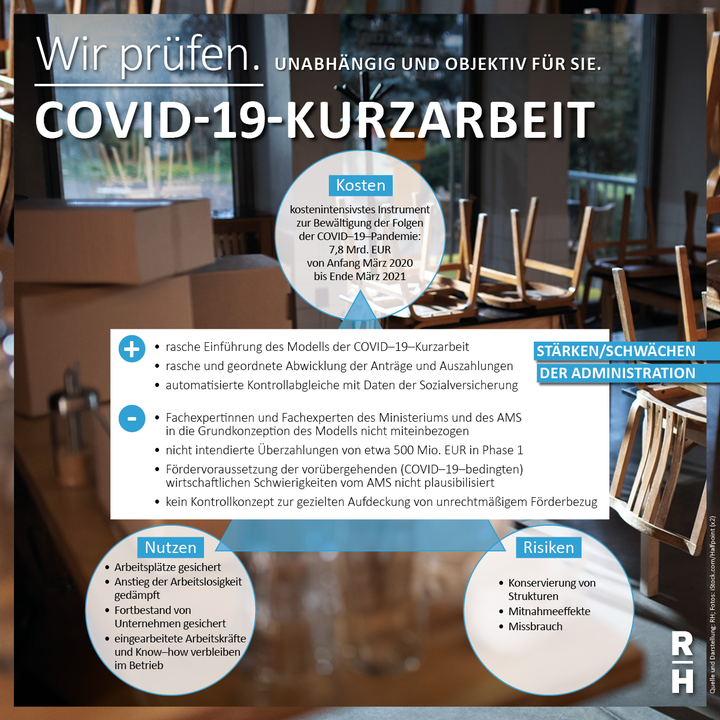COVID-19 short-time work: no concept for a targeted detection of misuse

The COVID-19 short-time work scheme has safeguarded jobs and mitigated the rise in unemployment during the pandemic. This is revealed in the report “COVID-19 Short-Time Work” published today by the Austrian Court of Audit (ACA). However, the ACA sees room for improvement as regards concepts to detect possible misuse: the checks applied were hardly suitable to verify the correctness of the hours lost. The audit covered the period from March 2020 until the conclusion of phase 3 in end-March 2021.
Cost-intensive tool
In the audited period, the COVID-19 short-time work scheme was the most cost-intensive tool devised to cope with the implications of the COVID-19 pandemic. It was largely paid from federal funds and exceeded by far the extent of the former short-time work scheme that was in place at the height of the financial and economic crisis in 2008/09. In 2020, 113,771 companies with 1.25 million employees were on short-time work. By comparison, 508 companies had made use of the short-time work scheme in 2009. In total, EUR 7.8 billion were paid out for the period of March 2020 to March 2021. By the end of 2021, the payments increased to EUR 9.2 billion.
The COVID-19 short-time work scheme provides for much more generous compensations than the previously existing scheme. Companies were fully compensated for the costs of hours lost. Workers were guaranteed comparatively high net salary replacement rates and a significantly higher income than in unemployment. These elements increase the attractiveness of short-time work. However, they also increase the risk of deadweight effects and reduce the pressure on companies and workers to reorient themselves.
Expert knowledge should be harnessed
Significant provisions of the COVID-19 short-time work scheme were left to be defined by the social partners. The labour market and funding experts of the Federal Ministry of Labour and the Austrian Public Employment Service (AMS) were not involved. This, however, could have increased the practicability of the model and may have possibly prevented fundamental implementation problems.
The ACA recommends to the Federal Ministry of Labour and the AMS to include – even under time pressure – the labour market and funding experts of the competent bodies in the design of funding plans, especially when it comes to plans with a financial and technical implementation component as was the case with the COVID-19 short-time work scheme.
Unintended overpayments of about EUR 500 million
The decision as regards the calculation model to be used for the COVID-19 short-time work allowance in phase 1 was made under great time pressure. During the application phase 1, which ran until end-May 2020, a systematic, unintended and not immediately recognized overpayment was made in the amount of EUR 500 million. The reason behind that was the application of an unsuitable calculation model.
No targeted verification of the settled hours lost
The extent to which the COVID-19 short-time work scheme was used presented an extraordinary administrative challenge to the AMS as the processing body. From summer 2020 on, it has succeeded in stabilizing and rendering the settlement process more professional. Automated cross-checks with the data of the Main Association of Austrian Social Security Institutions ensured structured and systematic settlement verifications.
Beyond that, however, no concept had been established to detect the unlawful receipt and misuse of funding. In particular, the question of a targeted control of wrongfully settled hours lost remained unresolved. In practice, the AMS requested working time records only in exceptional cases. It did not carry out on-site inspections for COVID-19 short-time work. A central element for determining the amount to be paid remained therefore largely unchecked. However, wrongly settled hours lost were among the most frequent reports for suspected fraud submitted to the AMS.
The ACA recommends to the Federal Ministry of Labour and the AMS to establish – also in coordination with the Federal Ministry of Finance – a control concept with risk-oriented assessment criteria to cover the unlawful receipt of allowances not covered by the automated checks.
Temporary economic difficulties as a funding criterion
An essential prerequisite for companies to receive short-time work allowance was the experiencing of temporary, non-seasonal and economic difficulties. Companies that had already been facing economic difficulties prior to COVID-19 were not eligible. The Federal Ministry of Labour and the AMS did not succeed in developing criteria for checking the plausibility of the central eligibility requirement, namely temporary economic difficulties. As a matter of principle, the AMS did not carry out any substantive examinations of this eligibility requirement.
The regulation was adapted twelve times
The administrative burden related to processing the COVID-19 short-time work scheme was further increased by the multiple amendments to the respective regulation made between March 2020 and March 2021. The original version of the regulation of 19 March 2020 was adapted twelve times by the end of March 2021, often retroactively.
Accuracy was of particular relevance
With the COVID-19 short-time work model, jobs could be safeguarded during the crisis.
In light of the continuation of the COVID-19 short-time work beyond 31 March 2021 and the high costs of the tool, the accuracy and the avoidance of deadweight effects were of particular relevance.
Trust: The ACA Podcast: Season 2 | Episode 7 – COVID-19 Short-Time Work (in German)
- pdf Datei:
- 3,990.3 KB
- Umfang:
- 122 Seiten
Report: COVID-19 Short-Time Work (in German)
From December 2020 to March 2021, the ACA audited the implementation and processing of the COVID-19 short-time work scheme. The audit aimed at outlining and assessing the design, use, costs and processing of the COVID-19 short-time work allowance – by taking into consideration the aspect of a citizen-friendly approach on the one hand and the prevention and control of misuse on the other hand. The audit covered the period from March 2020 until the conclusion of phase 3 in end-March 2021.


